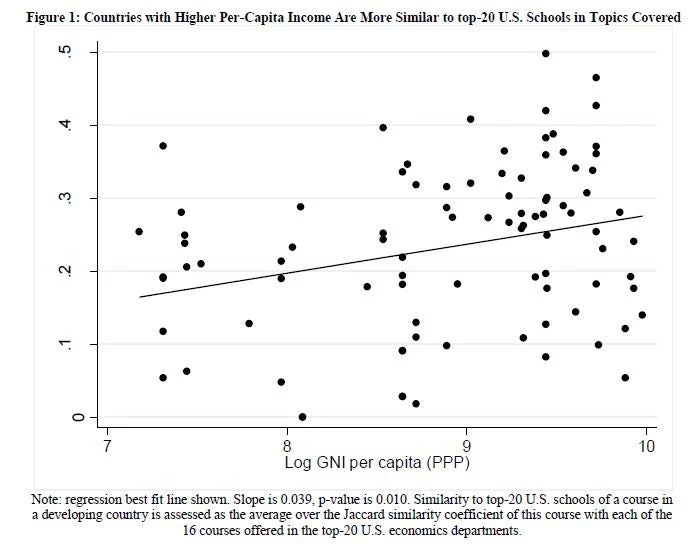Also available in: Français | العربية
Earlier this year I blogged about a research project I was beginning with Anna Luisa Paffhausen, that had the aim of seeing how development economics is taught in developing countries. Thanks in part to the help of our readers, we were able to collect a combination of syllabi, surveys, and exams from 145 undergraduate courses in 54 developing countries, and 81 masters courses in 34 developing countries. We then benchmarked these against undergraduate development classes taught in the U.S. at top-20 and non-top-20 programs. We now have a preliminary draft paper which I thought I’d share and see if our readers have comments. I summarize some of the key findings and recommendations below:What is taught as development economics?
- Not a very standardized view of what is crucial in development: only four of the 22 topics we looked at are taught in at least half of all undergraduate courses in developing countries: growth theory, poverty and inequality, human capital, and institutions. Courses in top U.S. departments are much more likely to cover credit markets, risk and insurance, land markets, data analysis, and experimental methods than courses in developing countries, while the latter are more likely to cover dependency theory, the environment, and macroeconomic management.
- Developing country courses are more dissimilar to one another than courses in the U.S.: Using similarity indices we show that both undergraduate and masters development economics courses in developing countries are less similar to each other than are undergraduate courses in the U.S. Moreover, the average developing country undergraduate course only overlaps with 23 percent of the course content with courses offered in top U.S. schools.
- Several important topics are rarely taught at all: these include entrepreneurship, firm growth, and international migration.
- The data revolution has not yet come to development courses taught in developing countries:
- In topic coverage: Developing country courses focus much more on concepts and models and less on empirical findings than U.S. courses.
- In assessment: developing country classes largely rely on written exams, essays, and presentations, and very rarely require students to use statistical software or answer
- Reflected in textbook choices: developing countries and non-top U.S. courses are more likely to be based around the textbook of Todaro and Smith (2014), first published in 1993 and now in its twelfth edition, and which relies heavily on case studies and stylized facts, while top programs are more likely to use the empirically-focused book of Banerjee and Duflo (2011), and the theory-based book of Ray (1998).
We measure the similarity between each developing country course and courses at top-20 U.S. schools and see what country and instructor characteristics are correlated with this degree of similarity. We find courses in poorer countries are less like those in top U.S. schools (see Figure below), as are courses in countries with a higher share of government involvement in the economy and countries with lower overall educational attainment. Instructors who are actively involved in research are more likely to have their courses closer to the frontier.

What could be done better?
The field of development economics has changed dramatically over the past twenty years. This is reflected in changes in the topics that command most research attention, and particularly in the rapid growth in data availability and empirical analysis. Our survey of how development economics is being taught in developing countries suggests that many classes have not kept pace with this change, and are not meeting key student learning goals of teaching students to be critical users and analyzers of data to answer economic questions. This is important since the next generation of policymakers responsible for implementing key development policies are likely to have their views of what policies they should pursue heavily influenced by what they have been taught.
We have several suggestions for how instructors can improve the teaching of development economics in developing countries (as well as in a number of developed country schools), but this is also where we would love reader feedback of good/innovative ways the subject is being taught:
- Take advantage of the availability of macro and micro data to have students do basic data analysis for their home countries. This could involve calculating poverty rates, plotting Lorenz curves, or estimating simple regressions that do not require complicated statistical knowledge.
- Have students work in teams to collect and analyze basic data about their home country. This could include, for example, visiting local marketplaces to attempt to understand how small shops compete with one another, collecting wage data from spot labor markets during different weeks of the class to see how stable wage labor is, or visiting firms to learn how they hedge against exchange rate risk (the latter was one of my most memorable assignments from my coursework in New Zealand, we each had to interview 5 firms about how they hedge, and then come back and share the experiences). More ambitiously, one could develop small panel surveys by having each new intake of classes return to the same settings year after year in order to build up rich knowledge of how the local economy works. Does anyone have any examples of undergraduate (or masters) classes in developing countries which actually do this?
- Don’t just rely on textbooks: Assign students readings from current newspapers, blogs, or magazines in order that they can apply what they are learning to current economic debate in their country.
- Consider ways to better share what is taught across instructors. Our analysis found very few syllabi were on the web (One noteworthy exception was a repository of Brazilian development economics syllabi collected by the Brazilian Network of Development Economics Education). Another potential role for regional associations here is continuing education, teaching instructors how to better incorporate a more empirical approach in their classrooms.


Join the Conversation